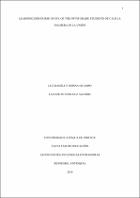Please use this identifier to cite or link to this item:
https://repositorio.uco.edu.co/jspui/handle/20.500.13064/617Full metadata record
| DC Field | Value | Language |
|---|---|---|
| dc.rights.license | http://creativecommons.org/licenses/by/3.0/ | - |
| dc.contributor.advisor | García, Carlos Andrés | spa |
| dc.contributor.author | Ospina-Ocampo, Luz Danelcy | spa |
| dc.contributor.author | Sánchez-Aguirre, Elizabeth | spa |
| dc.coverage.spatial | Sudamérica, Colombia, Rionegro, Antioquia | spa |
| dc.coverage.temporal | 2020 | es_ES |
| dc.date.accessioned | 2020-09-29T18:42:50Z | - |
| dc.date.available | 2020-09-29T18:42:50Z | - |
| dc.date.issued | 2020-09-29 | - |
| dc.identifier.uri | https://repositorio.uco.edu.co/handle/20.500.13064/617 | |
| dc.description.abstract | El objetivo de este proyecto de investigación es reconocer el discurso de aprendizaje de inglés de nueve estudiantes de quinto del Centro Educativo Rural (en adelante C.E.R) La Palmera de La Unión, a través del lenguaje verbal, percepciones y actitudes de los estudiantes. Esta es una investigación cualitativa, con el estudio de caso y la metodología hermenéutica, en la que se utilizan dos técnicas de recopilación de datos, entrevista semiestructurada y observación no participante. A través del análisis de contenido, surgen diferentes categorías y subcategorías que adquieren gran relevancia para el reconocimiento del discurso del aprendizaje del inglés. Mostrando como resultado que los estudiantes ven el inglés como un requisito, como una posibilidad y tienen diferentes percepciones, como las percepciones que tienen los estudiantes de quinto sobre el inglés, sobre el maestro, sobre los compañeros de clase y los compañeros sobre el maestro. Además, demostró que el hogar y la escuela son lugares donde se aprende inglés, y la participación y las actitudes de los estudiantes provienen de diferentes factores, por ejemplo, las actitudes de los estudiantes sobre los materiales y las actitudes de los maestros. Además, los estudiantes perciben los materiales como elementos necesarios para el aprendizaje del inglés. Durante la recopilación de datos, la palabra "poner" adquiere una gran relevancia porque es frecuente en las respuestas de los estudiantes de las entrevistas semiestructuradas. | es_ES |
| dc.format.extent | 53 | es_ES |
| dc.format.mimetype | application/pdf | es_ES |
| dc.language.iso | eng | es_ES |
| dc.publisher | Universidad Católica de Oriente | es_ES |
| dc.relation | Trabajo de grados | es_ES |
| dc.rights | info:eu-repo/semantics/openAccess | spa |
| dc.rights.uri | http://creativecommons.org/licenses/by-nc-nd/2.5/co/ | * |
| dc.subject | Discurso de aprendizaje | es_ES |
| dc.subject | Lenguaje verbal | es_ES |
| dc.subject | Percepciones | es_ES |
| dc.subject | Actitudes | es_ES |
| dc.subject | Inglés como lengua extranjera | es_ES |
| dc.subject | Ruralidad | es_ES |
| dc.subject | Estudiantes | es_ES |
| dc.subject | Cualitativo | es_ES |
| dc.title | Learning discourse of EFL of the fifth grade students of C.E.R La Palmera in la Unión | es_ES |
| dc.type | Bachelor thesis | es_ES |
| dc.description.abstractenglish | The objective of this research project is to recognize the English learning discourse of nine fifth students in the Centro Educativo Rural (Hereinafter C.E.R) La Palmera of La Unión (municipality of east of Antioquia), through verbal language, student perceptions and attitudes. This is qualitative research, with the case study and hermeneutics methodology, in which two data collection techniques, semi-structured interview and non-participant observation are used. Through the analysis of content, different categories and subcategories arise which acquire great relevance for the recognition of the discourse of learning English. Showing as a result that students see English as a requirement, as a possibility and they have different perceptions, such as, the perceptions that fifth students have about English, about the teacher, about classmates and the classmates about the teacher. Also, it showed that home and school are places where English is learned, and students’ participation and attitudes come from different factors, for instance, the students’ attitudes about materials, and the teachers’ attitudes. In addition, students perceive materials as necessary elements for English learning. During collection data the word “poner” takes a big relevance because it is frequent in the students answers of semi-structured interview. | es_ES |
| dc.subject.subjectenglish | Learning discourse | es_ES |
| dc.subject.subjectenglish | Verbal language | es_ES |
| dc.subject.subjectenglish | Perceptions | es_ES |
| dc.subject.subjectenglish | Attitudes | es_ES |
| dc.subject.subjectenglish | English as a foreign language | es_ES |
| dc.subject.subjectenglish | Rurality | es_ES |
| dc.subject.subjectenglish | Students | es_ES |
| dc.subject.subjectenglish | Qualitative | es_ES |
| dc.subject.lemb | Profesores rurales | es_ES |
| dc.subject.lemb | Educación rural | es_ES |
| dc.subject.lemb | Desarrollo rural | es_ES |
| dc.subject.lemb | Zonas rurales | es_ES |
| dc.subject.lemb | Lenguas extranjeras - estudio y enseñanza | es_ES |
| dc.type.hasversion | info:eu-repo/semantics/acceptedVersion | es_ES |
| dc.audience | Interés General | spa |
| dc.rights.accessrights | Open Access | spa |
| dc.rights.spa | Acceso abierto | spa |
| dc.rights.cc | Atribución-NoComercial-SinDerivadas 2.5 Colombia | * |
| dc.publisher.department | Ciencias de la Educación | es_ES |
| dc.publisher.program | Licenciatura en Lenguas Extranjeras | es_ES |
| dc.contributor.corpauthor | Universidad Católica de Oriente. Facultad de Ciencias de la Educación | es_ES |
| dc.identifier.bibliographicCitation | Ospina Ocampo, Luz Danelcy; Sánchez Aguirre, Elizabeth. Learning discourse of EFL of the fifth grade students of C.E.R La Palmera in la Unión(Trabajo de grado)Rionegro, Antioquia: Universidad Católica de Oriente; 2019. 53p. | es_ES |
| dc.type.driver | info:eu-repo/semantics/report | spa |
| dc.type.coar | http://purl.org/coar/resource_type/c_46ec | spa |
| dc.type.redcol | https://purl.org/redcol/resource_type/TP | spa |
| dc.type.local | Tesis/Trabajo de grado - Monografía – Especialización | spa |
| Appears in Collections: | Licenciatura en Lenguas extranjeras | |
Files in This Item:
| File | Description | Size | Format | |
|---|---|---|---|---|
| Learning discourse of EFL.pdf | 388.43 kB | Adobe PDF |  View/Open | |
| carta autorizacion.pdf Until 2050-12-30 | 109.21 kB | Adobe PDF | View/Open Request a copy |
This item is licensed under a Creative Commons License

